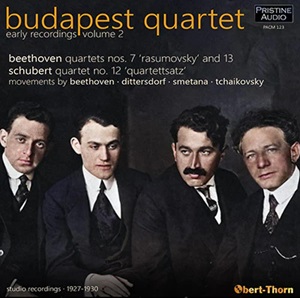
Budapest Quartet
Early Recordings, Volume 2
rec. 1927, Studio B, Hayes and 1928-30, Studio C, Small Queen’s Hall, London
Pristine Audio PACM123 [2 CDs: 111]
It’s been nearly a decade since the first volume in this series and in the interim Mark Obert-Thorn and Pristine Audio have been attending to other elements in the quartet’s discography from the 1930s. Now, though, it’s back to the quartet’s transitional years between 1927 and 1930 when second violin Imre Pogany was replaced by the first of the Russians, and the quartet’s eventual first violin, Joseph Roisman.
This volume is dominated by two major recording projects, Beethoven’s Op 59 No 1 (a typo in the documentation has it as Op 51) and Op 130. The earlier work dates from February 1929 when Roisman was already ensconced and is a stylish reading, deft and warm. When the Budapest recorded it for the last time in 1960 there were few significant tempo discrepancies. I’ve always liked first violin’s Emil Hauser’s Beethovenian instincts – his elfin slides and expressive tone were always a decided advantage – and Dutch cellist Harry Son provides a resonant bass line.
The Budapest re-recorded Op 130 between 1933-34, and it’s this recording that appears on Biddulph, so don’t get them confused, as Pristine’s version is from 1927-28. The 1927 sides feature Pogany, but the January 1928 session sees him replaced by Roisman. There were also two studios involved – Studio B, Hayes for the 1927 sides and Studio C, Small Queen’s Hall for those made in 1928. Acoustical changes aren’t especially noticeable and neither is the personnel change to any appreciable degree and while I’m at it, the side-joins have been carried out with Obert-Thorn’s accustomed excellence. The two recordings made only a few years apart – the later one was recorded in Berlin – are similar in tempi except for the Cavatina, which is rather more leisurely in Berlin. The main difference is that this earlier recording included a memorably fine Grosse Fuge, the quartet’s original finale, which really shows the group at something like its finest.
The twofer also includes single quartet movements recorded in 1928-29. The ensemble left behind no 78 recording of Op 18 No 5, the only one of the Beethoven quartets not to be recorded on shellac, so its Andante cantabile must come as a small consolation and souvenir. The Dittersdorf Menuet from Quartet No 6 was not the only isolated Dittersdorf movement they recorded and is welcome here. On 25 January 1928 the group recorded Schubert’s Quartettsatz, Smetana’s Polka from the First Quartet and the Andante cantabile from Tchaikovsky’s First Quartet. Both the Schubert and Tchaikovsky were to be re-recorded (Pristine PACM 113) when the conception of the Schubert was much more athletic and streamlined in the modern manner, but I rather like this earlier and generously-minded conception.
There’s the usual one-page producer’s note from Obert-Thorn. It’s been quite a wait for this volume, but it’s been well worth it, as the transfers are first-rate.
Jonathan Woolf
Availability: Pristine ClassicalContents:
Carl Ditters von Dittersdorf (1739-1799)
String Quartet No 6 in A major: Menuet
Ludwig van Beethoven (1770-1827)
String Quartet No 5 in A major, Op 18 No 5: Andante cantabile
String Quartet No 7 in F major, Op 59 No 1 ‘Rasumovsky’
String Quartet No 13 in B-flat major, Op 130
Franz Schubert (1797-1828)
String Quartet No 12 in C minor, D.703 ‘Quartettsatz’
Bedřich Smetana (1824-1884)
String Quartet No 1 in E minor ‘From My Life’
Pyotr Ilyich Tchaikovsky (1840-1893)
String Quartet No 1 in D major, Op 11: Andante cantabile


















